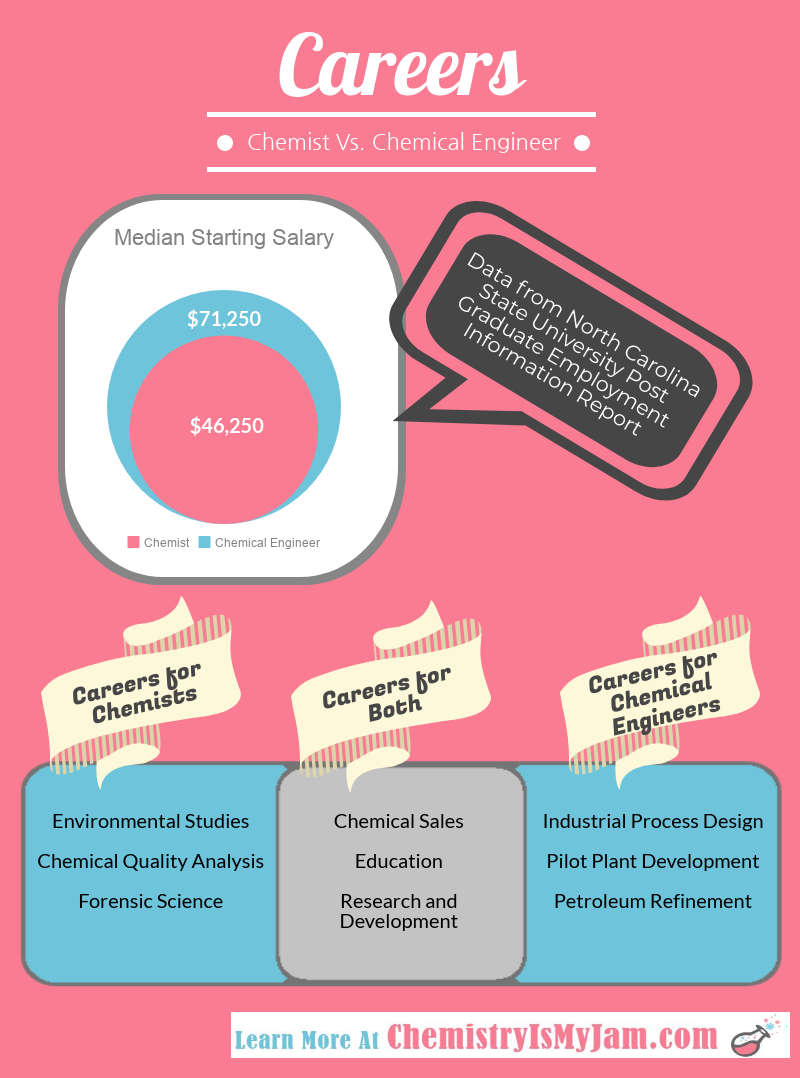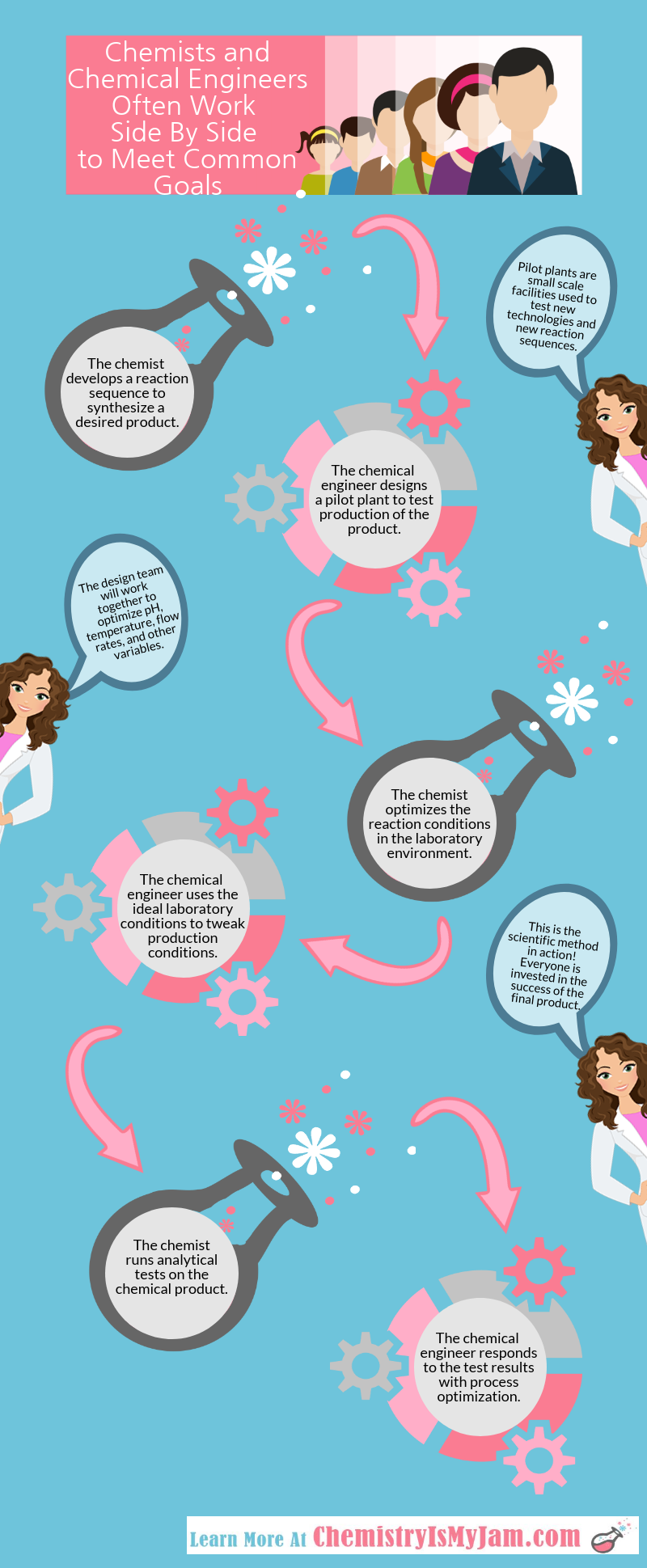what features must a pair of goggles have to be useable in a chemistry laboratory?

Every bit a chemic engineer who now teaches chemistry, I am often asked what the difference is betwixt a chemist and a chemical engineer? They both take something to do with chemistry and so they must be the aforementioned – right? Not quite. I am going to tackle this question from a few angles to try to clarify these ii bully career paths. Nosotros volition look at:
- The courses they take and the skills they learn.
- The differences in their career paths.
- How the two tin work side by side in industry.
- Which personality types might enjoy each field.
What Courses Do Chemists and Chemical Engineers Accept?
The best manner to compare the career paths of the chemist versus the chemic engineer is to compare the teaching they receive. I turned to a acme rated applied science school – Due north Carolina State Academy – for a comparison. Pulling up the semester by semester course of study for their BS in Chemical science and BS in Chemic Engineering programs gave me the information I needed. Here is a summary of the courses involved for these 2 fields:

The beginning two years for the two programs are substantially the aforementioned. Both programs are striking chemistry, calculus, and calculus based physics pretty hard. The chemist and the chemical engineer will become through two levels of general chemistry, two levels of organic chemistry, and quantitative chemistry.
Their paths brainstorm to diverge by the ocasional course in the sophomore year then become very different directions for the junior and senior years.
The chemist will go on to gain a much deeper understanding of physics of the atom. They will swoop securely into the theoretical side of their field and how to enquiry it. An entire class is dedicated to analytical chemistry, meaning the instrumentation that separates, measures, and identifies chemical compounds.
The chemical engineer is not as likely to need a deep understanding of the theories of the nucleus. Instead, they will need courses that set them to accept the work of the chemist and apply it in an industrial setting.
The chemical engineer will focus on how to design systems that will transfer fluids, maintain temperatures, mix materials, manage pH, and produce the desired products on a large scale.
Retrieve of it this way: in many cases the piece of work of the chemist is on a smaller scale in a lab setting. The chemical engineer takes the processes developed past the pharmacist and scales them up to the level of mass production. Both of these are incredibly important roles!
How Practise Careers Compare for Chemists and Chemical Engineers?
Before we leap also deeply into careers, I want to brand a small disclaimer. This information is based totally on generalities. Both chemistry and chemic engineering are competitive fields that can follow some amazing career paths. Whichever path you chose, you'll have an awesome degree. The world is your oyster!
We will talk about coin first – but go on in listen that money is not everything. NC Land collects voluntary information from their graduates regarding chore placement and bacon. This written report listed the median starting salary for chemical engineers as $71,000 and the median starting salary for chemists every bit $46,000.
I'll speculate a bit on why at that place is such a big deviation. Part of it is due to who they become to work for. The chemist data is going to be skewed by the fact that many chemists go to work in research. Research sometimes gets a bad rap considering people chronicle it to repetitiveness, simply research is crucial to your way of life! The trouble is that in some cases enquiry is grant funded and unable to pay the big bucks. Chemical engineers, on the other mitt, usually go to work for companies – companies who are producing products and bringing in profits. Companies who tin can beget to pay the big bucks. In that location are absolutely exceptions to this, but exist enlightened that this skews the bacon data.
Some other aspect to consider is the nature of the job. In many cases, chemists are sometimes in laboratory environments. This offers some level of consistency to their schedules. Chemic engineers are often working on a squad that is producing a product. These are processes that run around the clock and are non always kind to a person's personal schedule. This is an inconvenience that they are compensated for by an increment in salary.

There are many careers that are very appropriate for both the chemist and the chemic engineer. Both would find a comfortable home in chemical sales or education. Enquiry is ofttimes associated more with the chemist, but at that place are enough of enquiry fields where a chemical engineer could offer valuable insight.
(Recall…withal speaking in generalities.) There are some fields that tend to be more than suited for the chemist. Ecology studies, production quality analysis, and forensic science are good examples. The chemic engineer, however, is more likely to notice a career in industrial process design, pilot found development, and petroleum refinement.
Chemists and Chemical Engineers Often Work Together
In industrial settings, chemists and chemic engineers often work next to bear out different, but every bit important roles. Consider the instance of a company trying to develop a new chemical product. The initial reaction sequence would probable be developed in a laboratory surround by a chemist. The chemist would determine the best temperature weather, the ideal solvent for the reaction, how to maximize the kinetics of the reaction, and how to bulldoze the equilibrium of the reaction as far towards the products equally possible.
All of this information would be passed on to the chemical engineer, who would and then design a airplane pilot plant in an attempt to scale up the reaction. The chemist and the chemical engineer would piece of work side by side in an attempt to optimize the reaction weather – trying new ideas in the laboratory and taking successful ideas to the larger calibration.
As the desired products are produced, the chemist would run analytical tests to determine their purity and make suggestions for how to meliorate it's quality. The chemic engineer would respond to these suggestions by trying different scenarios in the pilot establish. This is the scientific method in activeness! This process is repeated over and over until optimum weather are accomplished.
This represents one scenario where chemists and chemical engineers work together. In reality, this is often a squad of people each playing unlike roles in the process.

What Personality Type Might Enjoy Existence A Chemist?
I'm going to beginning off with some other disclaimer. These are full generalities! If what you've read above about the life of a chemist appeals to you and yous enjoy the subject area, I say go for it!
The chemist frequently finds themselves in a laboratory environment. This brings some level of predictability to their schedule which many people appreciate. The life of a chemist ofttimes appeals to organized people who relish a consistent routine and don't mind working lone or in modest groups.
Can you picture yourself in a cute lab coat with comfortable closed toed shoes, a pair of rubber goggles, and a pony tail. This is not uncommon attire for a chemist.
What Personality Type Might Enjoy Being A Chemical Engineer?
(Call back…nonetheless speaking in generalities).
Chemic engineers oft find themselves in industrial environments, which tin be a bit dirtier and more than unpredictable than a lab. The day to day life of a chemical engineer is going to depend on the reliability of the process they are working on. Some days are quiet as they endeavour to tweak a beautifully running process. Other days are full anarchy with broken brawl bearings, chemic leaks, and failing pumps. This might appeal more to people who enjoy working in teams and don't mind a wrench being occasionally tossed into their routine.
Can you lot moving-picture show yourself in khakis, steel toed boots, prophylactic goggles, ear plugs, and a hard hat? This is what an boilerplate twenty-four hour period looks like for many chemical engineers.
What Did You Decide?
Two astonishing career paths, each with their own set of challenges and rewards. Which one appeals to you? I'd love to hear about it in the comments or through i of my social media channels!
Source: https://chemistryismyjam.com/the-difference-between-a-chemist-and-a-chemical-engineer/
0 Response to "what features must a pair of goggles have to be useable in a chemistry laboratory?"
Post a Comment